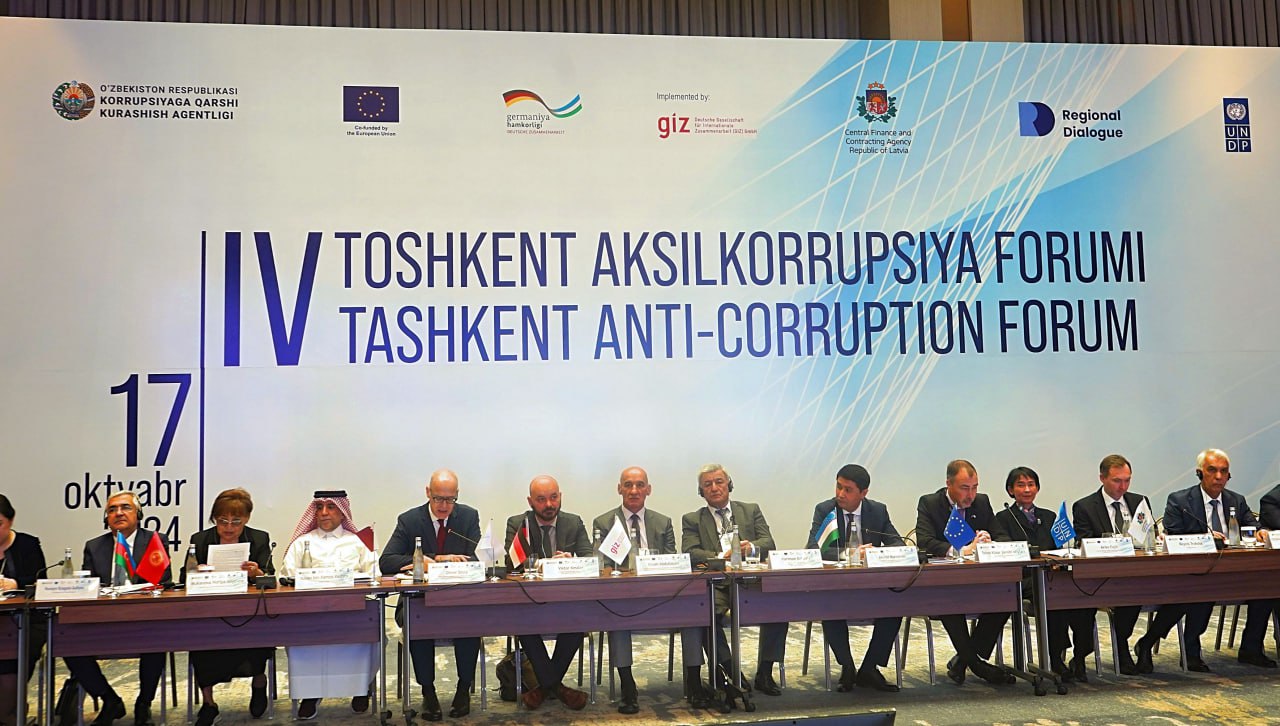Following the recent announcement of Uzbekistan’s long-awaited conflict of interest law, the country took another significant step in its anti-corruption efforts by hosting the IV Tashkent Anti-Corruption Forum. Organized by the Anti-Corruption Agency of Uzbekistan in collaboration with the European Union, GIZ (German Enterprise for International Cooperation), and the United Nations Development Programme (UNDP), the forum attracted over 250 representatives from anti-corruption agencies, international organizations, and civil society. The event spotlighted Uzbekistan’s ambitious reforms, including the successful implementation of its State Anti-Corruption Programme for 2023-2024, and provided a platform to discuss best practices, foster collaboration, and explore innovative strategies to combat corruption.

The forum opened with key remarks from Uzbekistan’s Anti-Corruption Agency Director, Dr. Akmal Burkhanov, who emphasized the importance of international collaboration. “We cannot fight corruption in isolation. It is an issue that transcends borders, and only through joint efforts can we make meaningful progress,” he said.
His Excellency Toivo Klaar, European Union Ambassador to Uzbekistan, echoed this sentiment in his speech, where he lauded Uzbekistan’s reforms: “Prevention efforts can unlock more internal and external investments, bringing more funds to healthcare, education, infrastructure, and other sectors that directly affect the everyday lives of people.” He also highlighted the moral and social costs of corruption, explaining how it “can restrict access to healthcare services, prevent people from entering or finishing university, and disrupt businesses.”
Another key speaker, UNDP Resident Representative Akiko Fujii, addressed the direct link between corruption and social inequality, stating, “Corruption undermines the achievements of all the Sustainable Development Goals by draining valuable resources and degrading public services, hence affecting the most vulnerable in society.” Fujii’s speech, delivered on the International Day for the Eradication of Poverty, underscored the impact of corruption on poverty and the urgent need for action.
Speaking at the forum, Dr. Viktor Kessler, Manager of the Good Governance Program implemented by GIZ, emphasized the progress Uzbekistan has made: “According to international indices, over the past 10 years, Uzbekistan has made significant efforts in combating corruption, improving its score in Transparency International’s Corruption Perceptions Index by 16 points. The fifth round of the OECD monitoring also showed great progress in the fight against corruption but emphasized that there is still much to be achieved.” Kessler further pointed out that Uzbekistan’s 2030 strategy includes ambitious goals, such as reaching at least 50th place in the Corruption Perceptions Index and halving violations in public procurement legislation.
Throughout the forum, Uzbekistan’s recent accomplishments in fighting corruption were a focal point. Uzbekistan’s success in the Organisation for Economic Co-operation and Development (OECD) 2023 5th round monitoring, where it scored over 86 points, was celebrated as a significant achievement. This score marked Uzbekistan as one of the leading nations in Central Asia for anti-corruption policies.
Dr. Oliver Stolpe, UNODC Regional Representative, praised Uzbekistan’s leadership in hosting regional anti-corruption initiatives. He highlighted the country’s success in asset recovery, pointing to the recent return of assets from Switzerland through the 2030 Vision Fund. “This recovery represents a key milestone in the global effort to recover stolen assets, and Uzbekistan has attracted worldwide attention for this achievement,” Stolpe remarked.
One of the major outcomes of the forum was the signing of a Memorandum of Understanding (MoU) between the Anti-Corruption Agency of Uzbekistan and the World Bank’s Integrity Vice Presidency. This agreement aims to foster collaboration in training personnel, joint project implementation, and anti-corruption research. “The MoU reflects our commitment to further enhancing our anti-corruption infrastructure and aligning with international standards,” said Burkhanov during the signing ceremony.
The forum also emphasized the critical role of technology in combating corruption. In his speech, Toivo Klaar stressed the importance of harnessing digital tools: “To stay ahead of emerging challenges, we must harness digital tools to improve transparency and accountability.” Uzbekistan’s State Anti-Corruption Programme for 2023-2024 includes the use of digital reporting platforms, mobile applications, and public procurement systems designed to reduce human interference in high-risk sectors.
A special session focused on “A New Era in Anti-Corruption: Innovative Technologies as an Effective Tool for Corruption Prevention,” where experts discussed the latest trends in the use of digital tools. Participants agreed that such technologies play a crucial role in improving transparency and reducing opportunities for corrupt practices.
Beyond technology, speakers stressed the need for an anti-corruption culture. Fujii pointed out, “Building a strong anti-corruption culture requires ongoing awareness raising and active engagement of civil society. Only when there is a shift in societal attitudes will we see real change.”
The role of civil society and the media in anti-corruption efforts was also recognized during an awards ceremony, where the government praised the contributions of non-governmental organizations and investigative journalists. “We must celebrate the media and civil society as essential partners in the fight against corruption. Their work increases transparency and holds governments accountable,” Burkhanov stated.
The forum also served as a reminder of the far-reaching consequences of corruption on society. As Klaar noted in his speech, “Corruption can impact trust between the government and citizens. This is why government bodies must work jointly with civil society and the media to raise awareness and ensure that citizens are empowered to fight corruption.”
Looking to the future, Uzbekistan remains committed to achieving its anti-corruption goals, including halving corruption violations by 2030. The comprehensive Anti-Corruption Strategy for 2030, developed in partnership with international organizations, aims to strengthen transparency, accountability, and public service delivery across all sectors. As Dr. Stolpe emphasized, “The implementation of recommendations from the UN Convention Against Corruption review will be essential in advancing Uzbekistan’s progress toward a corruption-free society.”
The IV Tashkent Anti-Corruption Forum concluded with a renewed sense of optimism and commitment to continued collaboration. “Real results come from implementation,” Mr. Klaar reminded participants. “New policies and frameworks are only the first steps. We must now turn these into tangible progress.”
Comments (0)